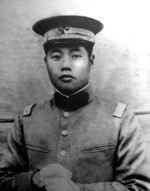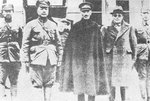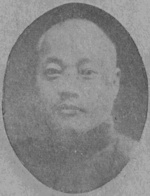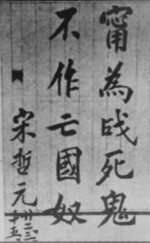Song Zheyuan
| Surname | Song |
| Given Name | Zheyuan |
| Born | 30 Oct 1885 |
| Died | 5 Apr 1940 |
| Country | China |
| Category | Military-Ground |
| Gender | Male |
Contributor: C. Peter Chen
ww2dbaseSong Zheyuan was born in Shandong Province, Qing Dynasty China. After being tutored by his scholarly maternal uncle, he enrolled in a military academy in Beijing in 1904. In 1912, he joined warlord Feng Yuxiang's 16th Mixed Brigade. In 1916, he was made the commanding officer of the 2nd Regiment under Feng. In 1917, he saw action against the forces of Zhang Xun who sought to restore Qing Dynasty. He would quickly gain fame as one of Feng's "Five Tigers". In 1926, he was made the governor of Rehe Province. In Nov 1927, he was made the Chairman of Shaanxi Province and was given command of the 2nd Corps of the National Revolutionary Army. In 1930, Feng failed in his attempt to overthrow Chiang Kaishek, and Feng's defeated forces were reorganized by Zhang Xueliang by the authority of Chiang. In Jun 1931, Zhang reorganized Song's forces into the Nationalist 29th Corps. In Jul 1932, he was made the Chairman of Chahar Province. In late 1932, Japanese forces invaded Chahar Province, and Zhang quickly ordered Song to prepare his men for battle. In Feb 1933, 10,000 Japanese and Manchukuo troops moved into Rehe Province, an area assigned to Song. On 8 Mar 1933, Song received Zhang's orders to defend the Xifengkuo area near the Great Wall. The subsequent action, with later exaggerated tales of Chinese soldiers resorting to using great swords (dadao), would gain him great fame. Nevertheless, the 29th Corps could not resist the better equipped and better trained Japanese. After the conclusion of the First Battle of Hebei, Song was relieved of his military command for the defeat and relieved of his Chahar Province chairmanship for his continued support for the defeated warlord Feng. In Jul 1935, he was made the commanding officer of forces in the Beiping-Tianjin region. During the years in the Beiping-Tianjin area, he established good relationships with Japanese officers. He would attempt to use the cultivated relationships to de-escalate the Lugou Bridge Incident of Jul 1937, but he would fail to do so. His defensive campaign would be marked by a series of indecision that inflicted heavy casualties on his 29th Corps, which would cease to be an organized force by Feb 1938. In the spring of 1938, he was made the commanding officer of the First War Area with direct command of the Nationalist 1st Group Army. After suffering from hepatitis, he resigned from military service in Mar 1940. Despite having received medical treatment in Guilin, Chongqing, and Chengdu, he passed away from his liver disease in Mianyang County, Sichuan Province, China in Apr 1940. He was buried on Fule Mountain in Mianyang County, Sichuan Province, China. He was posthumously promoted to the rank of General First Class and was awarded the prestigious Order of Blue Sky and White Sun.
ww2dbaseSource: Wikipedia
Last Major Revision: Sep 2014
Photographs
 |  |  |  |
Song Zheyuan Timeline
| 30 Oct 1885 | Song Zheyuan was born in Zhaohong Village, Leling County, Shandong Province, China. |
| 3 Mar 1933 | Song Zheyuan received Zhang Xueliang's orders to defend the Xifengkuo area near the Great Wall in northern China. |
| 5 Apr 1940 | Song Zheyuan passed away in Mianyang County, Sichuan Province, China. |
Please consider supporting us on Patreon. Even $1 per month will go a long way! Thank you. Please help us spread the word: Stay updated with WW2DB: |
Visitor Submitted Comments
4 Sep 2015 01:10:41 AM
Thank you, his birth place has been corrected.
All visitor submitted comments are opinions of those making the submissions and do not reflect views of WW2DB.

» First Battle of Hebei
» Lugou Bridge Incident and Second Battle of Hebei
- » 1,182 biographies
- » 337 events
- » 45,131 timeline entries
- » 1,249 ships
- » 350 aircraft models
- » 207 vehicle models
- » 376 weapon models
- » 123 historical documents
- » 261 facilities
- » 470 book reviews
- » 28,430 photos
- » 365 maps
Thomas Dodd, late 1945
Please consider supporting us on Patreon. Even $1 a month will go a long way. Thank you!
Or, please support us by purchasing some WW2DB merchandise at TeeSpring, Thank you!
3 Sep 2015 09:05:58 PM
He is not born in Sichuan. He is buried in Sichuan. He is from Shandong